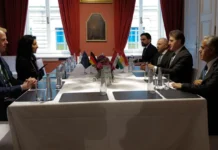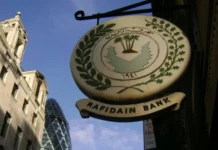Good Morning ,
Breaking Consensus: Diplomatic Recognition and Financial Realignment Signal Global Reset
From Western recognition of Palestine to BRICS currency strategies, the world is breaking from U.S.-centric governance — setting the stage for systemic change.
Western Powers Break Ranks on Palestine
The U.K., Canada, and Australia’s recognition of a Palestinian state marks a historic departure from decades of U.S.-aligned policy in the Middle East. By joining the 150 nations that already back Palestinian statehood, these Western allies send a powerful message: Washington no longer sets the sole terms of global legitimacy.
The recognition isn’t just symbolic — it changes the balance of U.N. votes, aid flows, and financial access for Palestine. It reflects the erosion of U.S. influence over its traditional partners, mirroring how sanctions fatigue and unilateral trade moves have driven nations to seek alternatives in finance and security.
BRICS and the Financial Parallel
While Western recognition reshapes the diplomatic map, BRICS continues to redraw the financial map.
- China’s yuan is gaining traction as a cross-border settlement tool through its CIPS network.
- Russia’s digital ruble is being positioned as a sanctions-proof settlement currency.
- India and Brazil are expanding local-currency trade, bypassing the dollar in energy and commodity flows.
These steps directly parallel the Palestinian recognition moment: both show the weakening of U.S. dominance — politically and financially. Just as allies now defy Washington in diplomacy, global markets are increasingly willing to defy the dollar in trade.
The Emerging Multipolar Order
Diplomatic recognition and currency realignment share a common driver: the rise of multipolarity.
- In diplomacy, Palestine gains legitimacy not because Washington approves, but because a critical mass of nations assert it.
- In finance, BRICS currencies gain traction not because they’re stronger than the dollar, but because nations need an alternative to U.S. control.
Together, these shifts highlight a world where legitimacy — political or financial — is no longer centralized in Washington. Instead, authority is dispersing across multiple poles of power.
Why This Matters
These two seemingly separate events — recognition of Palestinian statehood and the rise of BRICS financial infrastructure — are part of the same global reset arc. Both are about breaking dependence on a single authority.
- The political map is being redrawn as Western allies split from U.S. policy.
- The financial map is being redrawn as trade and payments shift away from the dollar.
Taken together, they signal a deep restructuring of the world order.
This is not just politics — it’s global finance restructuring before our eyes.
@ Newshounds News™ Exclusive
Sources:
Newsweek | BBC | WSJ | Watcher.Guru | BRICS Trade Reports
~~~~~~~~~
Digital Choke Points & Tokenization: Vietnam, Russia, China, and Hong Kong Show the Future of Finance
From mass account freezes to UBS token pilots, governments and banks are building the rails for a programmable financial order.
Vietnam’s Mass Freeze: A Trial Run for Total Control
Vietnam’s decision to freeze 86 million bank accounts under its biometric ID regime shocked global observers. For analysts like Jim Rickards, this wasn’t a domestic event, but a warning shot of how digital finance will be weaponized.
Once financial access is tied to state-controlled ID systems, citizens can be locked out overnight. Rickards warns the U.S. Genius Act may embed similar powers under the guise of stablecoin innovation — turning crises into opportunities for mass control.
Russia & China: CBDCs as Tools of Sovereignty
While Vietnam’s freeze highlights coercion, Russia and China showcase strategy.
- Russia’s digital ruble, slated for 2026, is pitched as “strong, reliable, and independent of commercial banks.” Finance Minister Anton Siluanov emphasizes its budgetary traceability, effectively putting government disbursements under permanent monitoring.
- China’s digital yuan continues to scale, integrated into cross-border settlement systems like CIPS. Beijing’s aim is to reduce reliance on SWIFT and the U.S. dollar, embedding the yuan deeper into trade flows across Asia, Africa, and the Middle East.
Together, these CBDCs extend state power while accelerating the global de-dollarization agenda.
Hong Kong & UBS: Tokenization Goes Institutional
Meanwhile, Hong Kong is moving in the opposite direction — not freezing accounts, but easing restrictions on tokenized assets.
- The Hong Kong Monetary Authority (HKMA) is relaxing Basel rules that penalized public blockchain tokens with extreme capital requirements.
- UBS has launched a pilot with DigiFT and Chainlink to automate tokenization, cutting costs and errors while integrating blockchain into traditional fund distribution.
- Global giants — JPMorgan, Citigroup, Deutsche Bank — are all running tokenization pilots, making RWA tokens (like Treasuries and private credit) the bridge between old finance and new rails.
This marks the other side of the transformation: institutionalizing tokenization under regulated frameworks.
The Dual Convergence: Control + Innovation
The story here is not Vietnam alone, nor UBS alone — but the convergence of state and corporate power through digital rails.
- States are embedding CBDCs and biometric IDs to tighten control.
- Banks are tokenizing real-world assets to increase efficiency, liquidity, and profits.
- Both sides are building the same programmable infrastructure, ensuring every transaction is traceable, stoppable, and monetizable.
Why This Matters
The world’s financial system is not just evolving — it’s being rewired. Vietnam’s freeze, Russia and China’s CBDCs, and Hong Kong’s tokenization reforms are all pieces of the same puzzle:
A global financial reset where access, assets, and money itself become programmable. The question is no longer if this model takes hold, but how fast and under whose rules.
This is not just politics — it’s global finance restructuring before our eyes.
@ Newshounds News™ Exclusive
Sources: ZeroHedge | Coingeek | Bitcoin.com | Watcher.Guru | Reuters
~~~~~~~~~
China Turns to Gold as Treasury Holdings Plummet
Beijing accelerates diversification away from U.S. debt, raising questions about the next phase of de-dollarization.
China’s Treasury Sell-Off
China shed $25.7 billion in U.S. Treasuries in July, cutting total holdings to $730.7 billion—the lowest since 2009 and down nearly 45% from the 2013 peak.
Gold and Euro Reserves
- Beijing is easing restrictions on gold import permits, extending their validity and expanding port access.
- Economists suggest China is shifting reserves into euros, pounds, and Swiss francs to hedge against dollar weakness.
- Macro analyst Luke Gromen calls gold accumulation an “elegant solution” to yuan depreciation, front-running citizens’ decades-long appetite for precious metals.
Why This Matters
China’s reserve realignment is not just financial housekeeping—it’s a signal. By holding less U.S. debt and more gold, Beijing is insulating itself from Washington’s leverage. Yet this move also illustrates the fragmented approach to de-dollarization: sovereign hedging rather than a unified BRICS front.
This is not just politics — it’s global finance restructuring before our eyes.
@ Newshounds News™
Source: Daily Hodl
~~~~~~~~~
BRICS Dream Shattered: Why They Can’t Replace the U.S. Dollar
Three years of de-dollarization have not broken the greenback’s dominance.
Global Trust in the Dollar
- The U.S. dollar remains the most reliable safe haven, backed by the world’s largest capital market.
- BRICS local currencies lack credibility and global usage.
Internal Rivalries
- China wants yuan dominance, but India resists.
- Russia rejects the rupee for oil deals, undercutting India’s ambitions.
- No unified BRICS currency has emerged.
Dollar Still Dominates Trade
Despite BRICS producing over 44% of global commodities, the USD is still used in 88% of global transactions. Even sanctioned economies like Russia and Iran settle trades in yuan only out of necessity, not preference.
Why This Matters
The BRICS alliance can weaken the dollar’s edges, but without trust, cohesion, and a single settlement system, the USD’s global role remains secure. De-dollarization is happening, but slowly and unevenly—Washington still holds the commanding heights.
This is not just politics — it’s global finance restructuring before our eyes.
@ Newshounds News™
Source: Watcher.Guru
~~~~~~~~~
Seeds of Wisdom Team RV Currency Facts Youtube and Rumble
Newshound’s News Telegram Room Link
Follow the Gold/Silver Rate COMEX
Follow Fast Facts
Seeds of Wisdom Team™ Website






